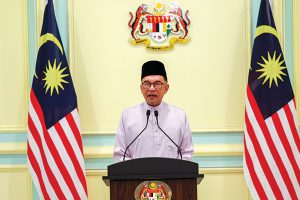Bloomberg
Malaysian Prime Minister Anwar Ibrahim won a confidence vote in parliament, as he looks to prove the coalition he put together after last month’s election can govern effectively following years of political instability.
Anwar won the support of the majority of lawmakers in a voice vote, according to Speaker Johari Abdul. The prime minister’s choice for parliamentary speaker earlier received 147 votes — one shy of a two-thirds majority in the legislature, which no Malaysia government has seen since 2008.
The vote strengthens Anwar’s mandate to formulate a budget for next year and help Malaysians deal with rising living costs as the economy heads for a slowdown. It also brings the prospect of a stable government to a nation that has had four prime ministers in four years.
The victory ensures that “the legitimacy of Anwar’s leadership is not questioned,†said Sivamurugan Pandian, a political analyst at Universiti Sains Malaysia. It will enable Anwar to “move
forward for the betterment of the nation.â€
The outcome was expected after party leaders in Anwar’s unity government signed a pact to ensure his administration completes a full five-year term. “There is no reason why we should be talking in terms of fragility or problems to be encountered,†Anwar, 75, had
told reporters after the signing ceremony.
Malaysia’s general election last month led to a hung parliament, with opposing alliances competing to secure a majority for days after the vote. Intervention by the nation’s king led to the formation of a unity government with Anwar at the helm and Barisan Nasional, the coalition that had ruled Malaysia almost without interruption since its independence in 1957, as the second-largest bloc in the administration.
Through his Pakatan Harapan alliance and Barisan Nasional alone, Anwar controls a simple majority in parliament. But the partnership also presents potential difficulties for the veteran politician.
Anwar named Barisan Nasional chief Ahmad Zahid Hamidi as one of his two deputies on December 2 to seal the bloc’s allegiance. The question is how long Zahid will continue to serve as president of the United Malays National Organisation (UMNO), which is the linchpin of the broader Barisan Nasional coalition. UMNO must hold internal elections by May 19, and Zahid has faced calls to resign for the party’s poor showing in the nationwide vote.
A new UMNO head may not be as supportive of an alliance with Anwar’s group.
Several states will be holding local elections next year upon expiry of their legislative assemblies. While the polls have no direct bearing on the composition of parliament, they will be a measure of the new government’s popularity among the public.
Two local polls earlier this month suggest Anwar faces an uphill battle to win Malaysians over — particularly the majority ethnic Malays.
In the northern state of Kedah, Anwar’s Pakatan Harapan lost a parliament seat it controlled since 2008 by a margin of more than 16,000 votes. Barisan Nasional retained another seat in Pahang state by a mere 573-vote majority.
“You are the prime minister now,†said opposition leader Hamzah Zainudin, addressing Anwar during the parliamentary debate ahead of the vote. But “the people know that Perikatan Nasional has a rather large support base,†he warned, referring to the opposition alliance.
Attention now turns to Malaysia’s budget. Anwar, who also doubles as the finance minister, has said he was reviewing the 2023 annual spending plan presented by his predecessor, while indicating that most of the proposals in there would remain untouched.
 The Gulf Time Newspaper One of the finest business newspapers in the UAE brought to you by our professional writers and editors.
The Gulf Time Newspaper One of the finest business newspapers in the UAE brought to you by our professional writers and editors.
